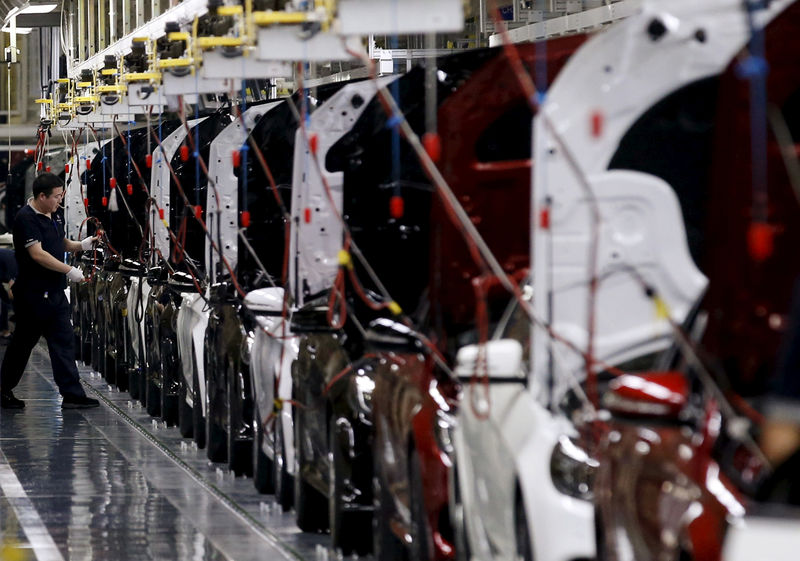BEIJING (Reuters) - Pressure on China's factories eased a little in July thanks to growth-boosting steps from the government, but overall manufacturing activity remained in contraction as a trade war with the United States dented export orders, a private survey showed on Thursday.
The readings were largely in line with an official gauge that showed factory activity last month shrank at a slower-than-expected pace.
The Caixin/Markit Manufacturing Purchasing Managers' Index (PMI) for July rose to 49.9 from 49.4 in June, and just below the neutral 50-mark dividing expansion from contraction on a monthly basis.
That was slightly above economists' expectations of 49.6, according to a Reuters poll.
"China's manufacturing economy showed signs of recovery in July. Policies such as tax and fee reductions designed to underpin the economy had an effect," Zhengsheng Zhong, Director of Macroeconomic Analysis at CEBM Group, wrote in a note accompanying the data.
The moderate improvement seen in the survey was partly driven by a recovery in domestic demand, with July factory output growing marginally after a brief drop in the previous month.
New orders also swung back to expansionary territory at 50.2 but remained much weaker compared with the historical average.
The still-soft conditions were underscored by new exports orders shrinking again in July amid deteriorating global demand. While the slump was less severe than in June, the outlook remained clouded with survey respondents citing the China-U.S. trade dispute for dampening sales to foreign customers.
U.S. and Chinese negotiators ended a brief round of trade talks on Wednesday with little sign of progress and agreed to meet again in September. It was their first in-person talks since a G20 truce in June as both sides try to find a way out of the year-long dispute.
Earlier in the week, U.S. President Donald Trump warned Beijing against waiting out his first term to finalize any trade deal, saying if he wins re-election in the November 2020 U.S. presidential contest, the outcome will be worse for China.
While the latest survey showed business confidence for the year ahead picked up from June's record low to a three-month high in July, some companies surveyed anticipated that the trade dispute will weigh on future output.
Factory gate prices also declined for the first time since January, which could rekindle worries about deflation and prompt more aggressive stimulus from Beijing.
China's top decision-making body of the ruling Communist Party said on Tuesday that government will step up efforts to boost demand and support the economy, but will not use the property market as a form of short-term stimulus.
The labor market remained sluggish in a sign of broadening stress across key industries. Manufacturers shed jobs for the fourth straight month, the quickest pace since February, the survey showed.
So far, Beijing has relied on a combination of fiscal stimulus and monetary easing to support an economy growing at its slowest pace in nearly 30 years, including hundreds of billions of dollars in infrastructure spending and tax cuts for companies.
But the economy has been slow to respond, and business confidence remains shaky, weighing on investment.
China observers have said that Beijing's recent growth-boosting measures will take time to filter through to the broader economy, and many analysts are of the view that further stimulus is needed to prevent a deeper downturn and to help stabilize growth.
People's Bank of China (PBOC) Governor Li Gang said recently that current interest rate levels are appropriate, but traders are speculating that China could trim rates soon after the U.S. Federal Reserve cuts its main benchmark rate.

As widely expected, the Fed on Wednesday eased policy for the first time since the financial crisis, but doused market views that it would embark on a lengthy easing campaign.